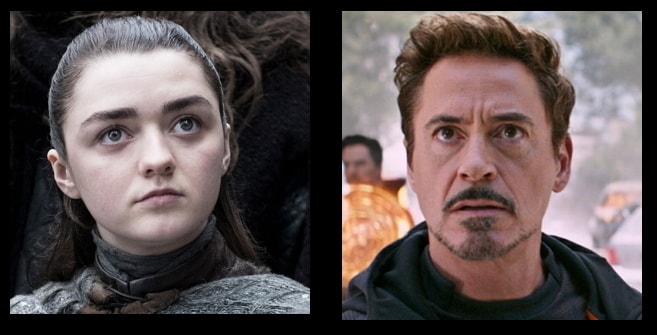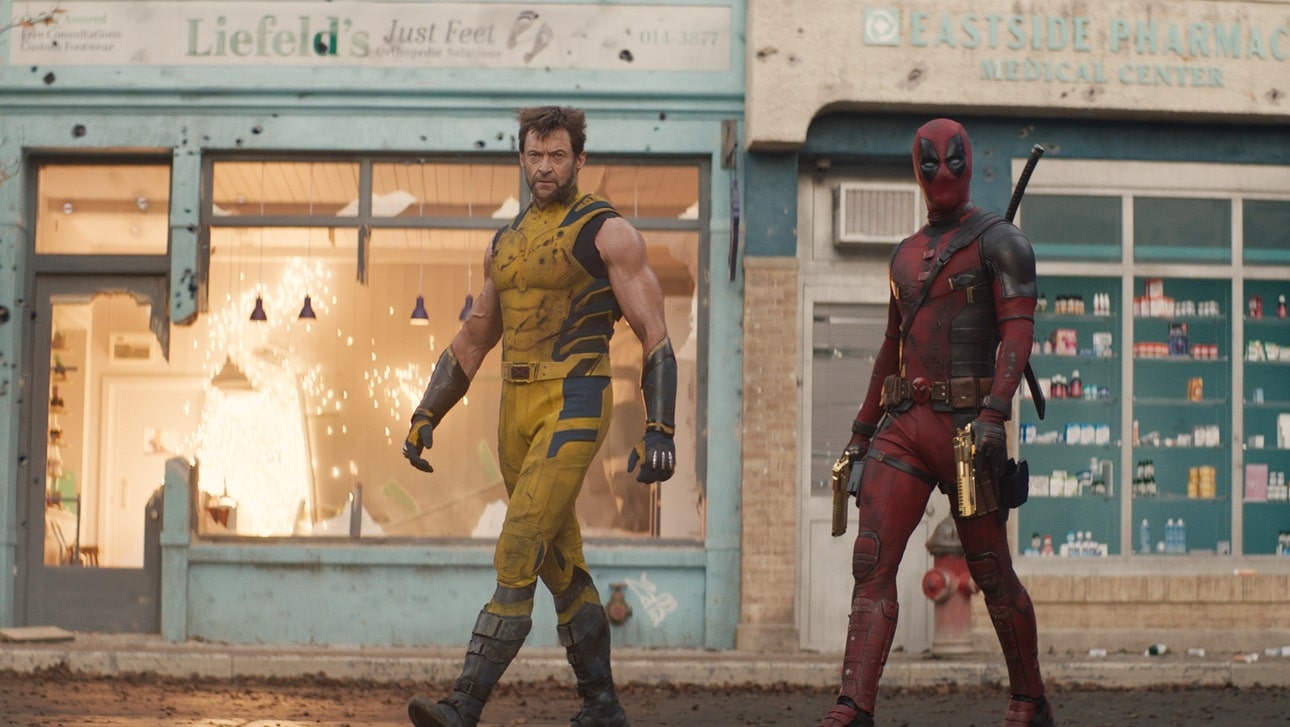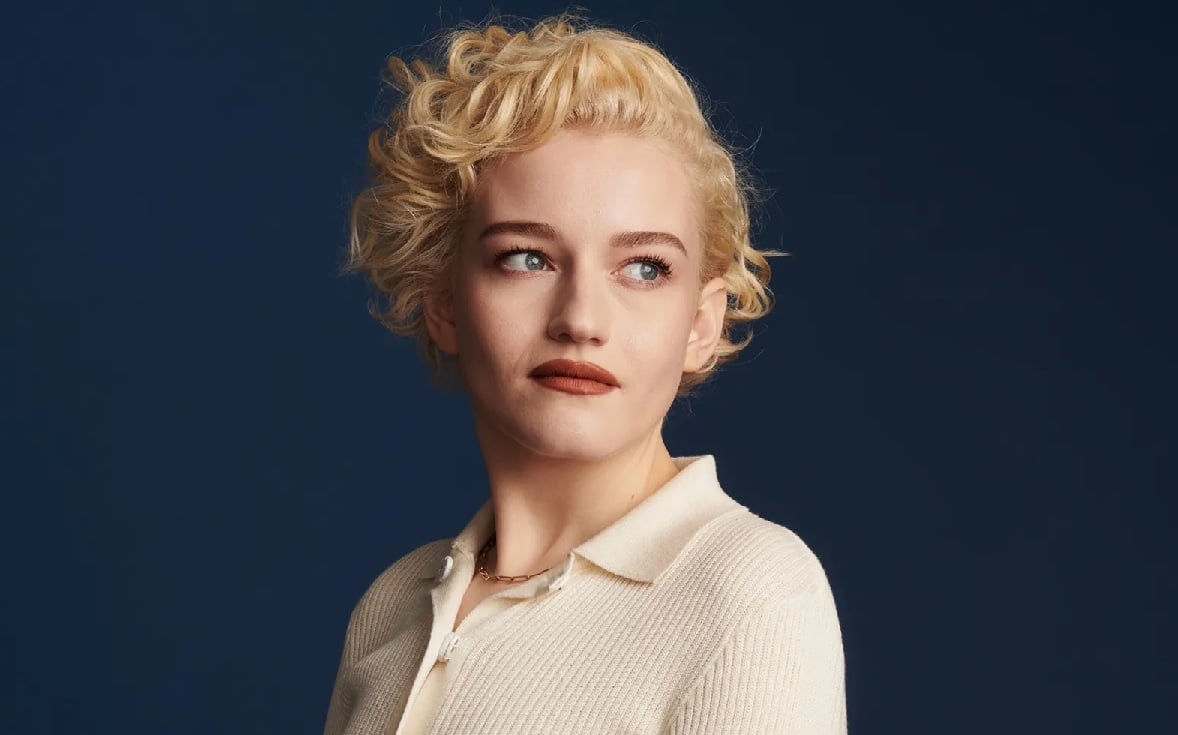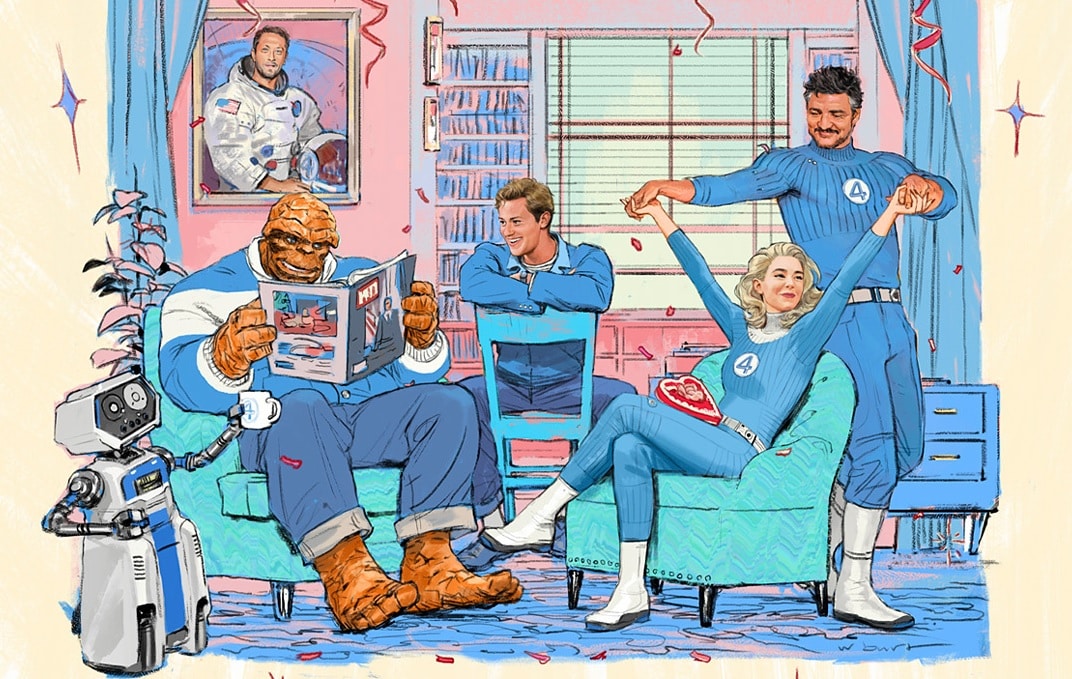Mild spoilers for Game of Thrones and Avengers: Endgame below
How was your #Fanmageddon Week?
I confess to being emotionally drained. All the hype, all the fan theories, all the speculation. Guessing who would live and who would die in Avengers: Endgame and The Battle of Winterfell has been a full-time occupation for the last few months.
Seeing the culmination of a combined two decades of character arcs, life or death battles, redemption, and Easter eggs – all in the space of a few days – was an intense experience, the likes of which we shall never see again.
All the memes, all the fanfic, all the in-jokes. Game of Thrones and the MCU are the two biggest franchises of this entertainment era. That they both reached a story climax at the same time… it was almost more than Twitter could bear!
I’m a sucker for a story with an unhappy ending, provided that it comes after a glorious campaign of noble struggle against inevitable death. Butch Cassidy and the Sundance Kid, Thelma and Louise. Old Yeller. It feels good to say The End and it’s usually for the best. There’s a reason why the myths that went on after the Hero’s Great Triumph end in such sad, sometimes pitiful, deaths. Heracles and Jason are betrayed by their angry housewives (a little misogyny thrown in for good measure.) King Arthur doesn’t make it out of the Battle of Camlann alive, and his Roundtable, his best knight and his queen are all dead or exiled.
My favorite, as you all know, is The Silmarillion, Tolkien’s exercise in mass elficide, where only a handful of protagonists make it out alive, and the more people fight against the darkness, the more they succumb to their grievous wounds. Tolkien kept things at a great remove (probably because he never actually wrote books, just a series of drafts), but George R. R. Martin brought us to ground level for the slaughter, a trend that the TV showrunners stuck with for as long as there was a book to guide them.
Left to their own devices, Benioff and Weiss gave viewers a Winterfell death count that was…far too light, went many complaints. I realize we have three 80 minute episodes to kill more favorites, but B&W clearly don’t have the stomach for murdering our darlings that Martin had.
Over in the MCU, the deaths were mostly contractually mandated, and survival depends on the status of your upcoming Disney+ show. It might have been all business at some point, but the inevitable was handled with a certain degree of emotional honesty.
(OK, I’m still a little troubled about Black Widow, the only girl who got to play the whole game with the boys, but she went out with noble struggle all the way.)
Stories end. Heroes die. We tell the stories again and relive the journey as a way to deny the inevitability of death. It’s part of how we process our own mortality, rationalizing death as part of a circle or as the darkness that gives the spark of life its definition.
I woke up Monday morning thinking that my friend Michael Davis had succumbed to his own noble struggle. The words you are reading now would have been about him, about the many memorable moments of our friendship, how he’s one of the funniest, smartest, most talented people I’d ever met.
That death turned out to be a story, too.
A cruel hoax, a hack. Someone’s idea of humor. After all the real fictional death, processing this fake fictional death put everything in real life into a greater perspective.
I do believe that reading and watching the noble struggle of our fictional heroes is what helps us with our own daily noble struggle…a struggle that often seems very, very far from noble. If some omniscient author was writing our stories, we might never know the most important episodes, the moments when we touched someone the most, or offered the help that was most needed.
(We might never know the moments when we were the biggest assholes, either. That’s part of the package, alas.)
It may seem sometimes that the struggle is too much, and we’ll go to that dark place. Everyone has been there. Most of us return. Some don’t. And the tragedy is that someone, somewhere, always had a light. There’s always someone to say “Not today.”
If you are considering suicide or fear you may become suicidal, please call the National Suicide Prevention Lifeline 24/7 at 1-800-273-TALK (8255), or visit SuicidePreventionLifeline.org. If you live outside the U.S., you can find a list of suicide-prevention hotlines worldwide here.
[This column originally appeared as part of The Beat’s weekly newsletter. You can subscribe to it here.]
Home Columns Kibbles 'n' Bits Kibbles ‘n’ Bits: Noble Struggle in Avengers: Endgame and Game of Thrones









I’m so glad you reprinted this!!!!
Finally Heidi and I agree to some extent on something:
“…at least Feige does a better job getting rid of the Old Guard than Disney did with that of STAR WARS.”
— last line of my review;
https://nummtheory.blogspot.com/2019/05/avengers-endgame-2019.html
I’m trying to be indirect here so as not to spoil, but read with care….I wonder how people would have reacted if Vormir played differently? I quibble with some of that–and really more the reaction to it within the movie–but I’m not sure what they could have done that would have been as effective. She got her big moment while Hawkeye, yet again, had to play sixth fiddle. Both in terms of her long-term character arc and the logic of the movie narrative–Vormir had to turn out that way for someone given Infinity War–it made a lot of sense. The original six–again excluding sixth wheel Hawkeye–ended up the opposite of where they started in the MCU. There was a nice balance to it all. If Clint had been the star on Vormir, it seems Nat might have just ended the movie, and her character arc, with no clear resolution. In other words, she would have been reduced to sixth. She deserves more than that, in my mind, because only Steve and Tony had bigger/better stories than her in the MCU. (Although, and I know this isn’t a popular opinion in some circles, I think they did a mostly excellent job in making Thor’s arc satisfying. A feat considering how unimpressive his movies are. Hulk’s cathartic moment was offscreen, hence not terribly effective.)
Is there nothing to discuss these days but huge franchises from gigantic corporations? Apparently not;
https://www.rogerebert.com/mzs/avengers-mcu-and-the-content-endgame
I’ve been quiet about my total lack of interest in “Game of Thrones,” because its fans tend to get VERY angry and vitriolic when someone doesn’t show proper enthusiasm. This is the true revenge of the nerds — nerds as the new bullies.
I may abandon social media before the drum beat begins for a Best Picture Oscar for “Endgame,” and an AFI Lifetime Achievement Award for Kevin Feige. (MCU fan: “Kubrick? Welles? Hitchcock? No-talent nobodies. Feige — he the man.”
Neither Game of Thrones nor Avengers: Endgame matter much to me (and I didn’t see either); I’m a fan of comic books as a medium not a fan of comic-book-like “genre” media properties across media. I’m also not a fan of video games, which seems to be the increasingly most obvious touchstone for the aesthetics of “comic book movies” instead of actual comics (Spider-Verse being a notable—and much welcome—exception). The weekend Endgame opened, I went to see Amazing Grace and last weekend I went to see Brian De Palma’s Sisters and Body Double.
George said: “Is there nothing to discuss these days but huge franchises from gigantic corporations?”
Though it’s true that the MCU would not exist if it wasn’t for huge corporations with deep pockets, those origins are not the reason why their fans like them.
The eternal struggle is always between the popular and the elite, not the wealthy and the non-wealthy.
Back in the fifties Mickey Spillane was a best-selling author. No corporations behind him, but the elitists hated his guts.
An anecdote: supposedly some elitist guy recognized Spillane on the street and upbraided him by saying, “I’m disgusted that two of your books were on the best-seller list this year.”
Spillane: “You’re lucky I only wrote two books.”
I saw “Endgame” and thought it was a very good movie. I was referring to the over-the-top hyperbole around the film.
Let’s wait a few decades before we call any movie a “classic” or a “masterpiece” or “something we’ll tell our grandchildren about.” It’s impossible to know which movies will stand the test of time. A lot of box-office hits and Oscar winners have been forgotten. And a lot of movies that were critical or commercial flops are now regarded as classics.
And, Gene, “elites” barely exist anymore. They have no power whatsoever, and they’re no longer cultural gatekeepers. The days when snobs like John Simon or Rex Reed would go on TV and bash whatever was popular are decades in the past. Now almost everyone is a pop culture fan of some sort.
As Seitz tweeted, the idea that there’s someone with a top hat and monocle and British accent out there, trying to keep people from loving Star Wars or Batman, is absurd. Pop has triumphed over what used to be called high art. You may regard that as good or bad, but it’s an undeniable fact.
You don’t need a top hat and a monocle; just a series on HBO. Read Bill Maher’s infamous pissing contest with Stan Lee fans and get back to me.
The elitism to which I referred deals with attitudes toward fiction and what it ought to do, and that attitude is still around, though it’s morphed into a more thoroughly politicized agenda. It;s not the same as it used to be, but IF it has less power than in the days of John Simon– and my Spillane example was meant to show that even back then, the popular trumped the elite– that’s just ,made it necessary for elitists to take a new approach.
There is an attitude, especially among mature fans (the Boomers and older Gen X’ers), that the bullies who made fun of them in elementary school for reading comics or sci-fi are still out there. Every time they read a review of a superhero movie that isn’t 100% percent positive, they flash back to an unpleasant moment on the playground.
If “elitists” had any power, the careers of Michael Bay, Zack Snyder and Adam Sandler would have ended long ago. And if you think Bill Maher has any influence these days, you’re sadly mistaken.
As far as I’m concerned, the question is still not who has the most influence, but the ways in which different parties try to keep some degree of influence.
I never said, for instance, that elitists like Bill Maher have more power than populists like Kevin Feige. The popular arts win over the elite arts in terms of making money, whether it’s Feige or Spillane. The elite arts then win all the awards, and maintain their lesser influence by holding the Damoclean sword over “true quality” over the heads of viewers. That’s why BLACK PANTHER had no chance of winning Best :Picture– though it was
certainly a better film than BLACKKKLANSMAN– and I don’t think your scenario of Feige’s awards-adulation will come true any time soon.
Keep in mind that Hitchcock, whom you mention in your first post, also didn’t get past ALL of the cultural gatekeepers.
To clarify, I wasn’t trying to assert that KLANSMAN did win, but that it was a critical favorite in comparison to PANTHER. The former’s loss generated a certain amount of fault-finding; the latter’s did not.
Comments are closed.